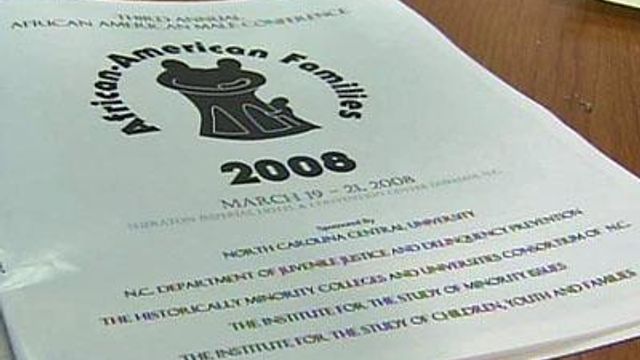Conference Focuses on Improving Futures for Black Men
African American men make up about 10 percent of North Carolina's population, but account for nearly 60 percent of the prison populace. A Triangle conference focuses on finding community solutions to that troubling statistic.
Posted — UpdatedBefore Demario Atwater and Laurence Lovette were charged in connection to the slaying of UNC student Eve Carson, and Lovette with Duke University student Abhijit Mahato’s death – both men had criminal records.
“If it isn't a wake up call, I don't know what its going to take,” said Bruce Lightner, chairman of the Raleigh Martin Luther King Jr. Celebration Committee.
Lightner, who also owns Lightner Funeral Home, said the cases highlight the concerns over young black men being more likely to go to jail or join gangs than other demographic groups.
“Young people who commit such violent acts randomly are not prone to do that on their own,” he said.
North Carolina Central University has taken notice of the trend. For the third year, the school is sponsoring the conference, "The African-American Male. The Issues: Education, Family and Role Models."
“Unfortunately, the role models are BET (Black Entertainment Television) and MTV (Music Television), and those do not define black malehood for me,” said Dr. Jonathan Livingston, NCCU assistant professor of psychology and the co-director of the Institute for the Study of Children, Youth and Families.
“I think these conference topics will be part of a preventative effort if we can get individuals to come out and participate,” said Dr. Dorothy Singleton, NCCU associate professor and the director of the Institute for the Study of Minority Issues.
Singleton and Livingston are co-directors of the NCCU's conference. They echo Lightner's concerns about violence in all segments of the population.
“There are shootings in the Triangle on a daily basis; that's a sad commentary,” Lightner said. “It's going to take a movement, a change in cultural values and an understanding among all groups with what's going on here."
A change, Lightner says, starts by reaching young people.
African Americans reportedly drop out of school at a disproportionately higher rate than whites, and most of the black dropouts are boys. The state average for black dropouts is 37 percent. In Wake County, 46 percent of the dropouts are black, and Durham County's percentage is 65 percent.
The NCCU conference began Wednesday afternoon with a focus on black families. Thursday, there will be a panel on gangs.
The conference runs until Friday at the Sheraton Imperial Hotel and Convention Center at 4700 Emperor Blvd. in Durham.
• Credits
Copyright 2024 by Capitol Broadcasting Company. All rights reserved. This material may not be published, broadcast, rewritten or redistributed.






